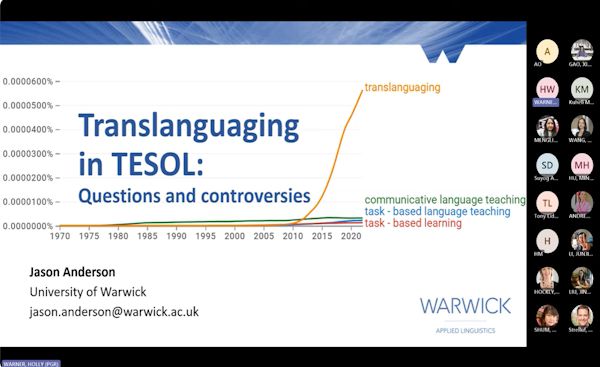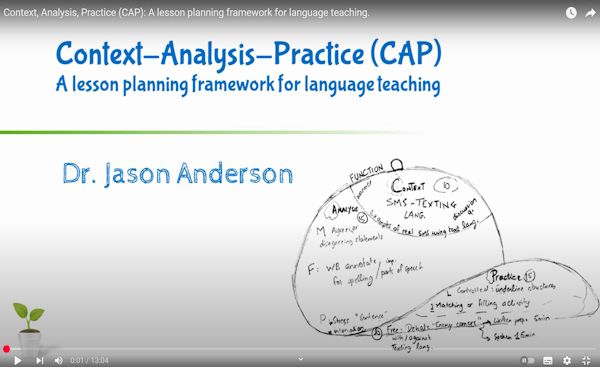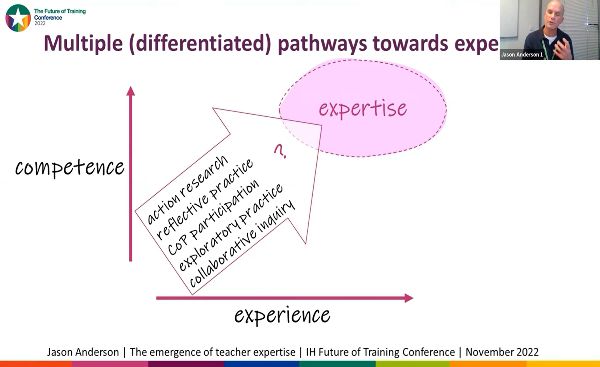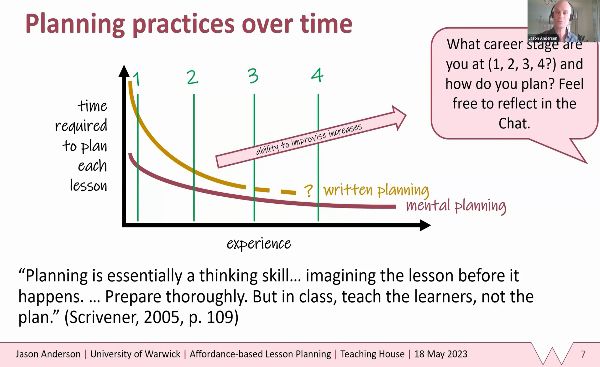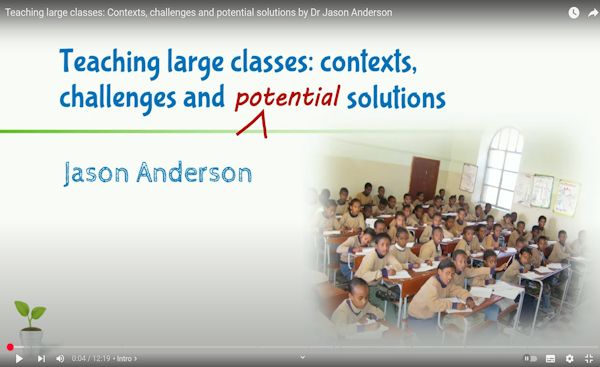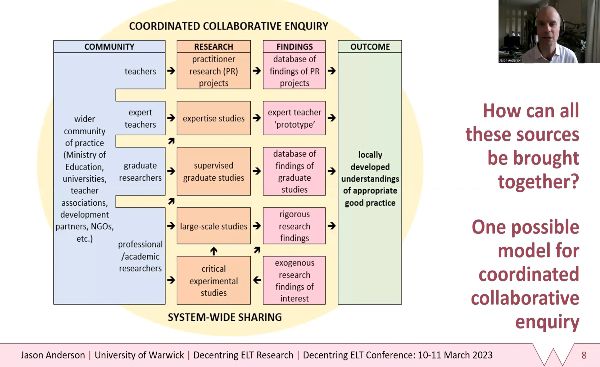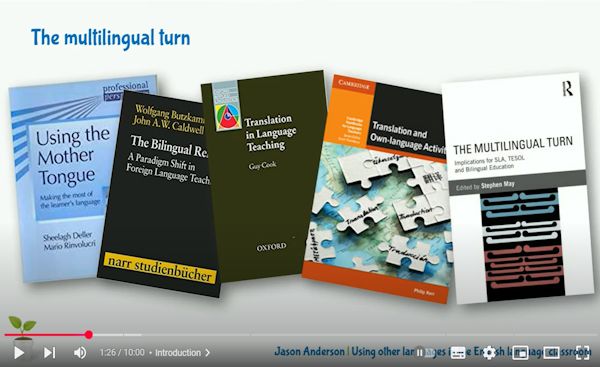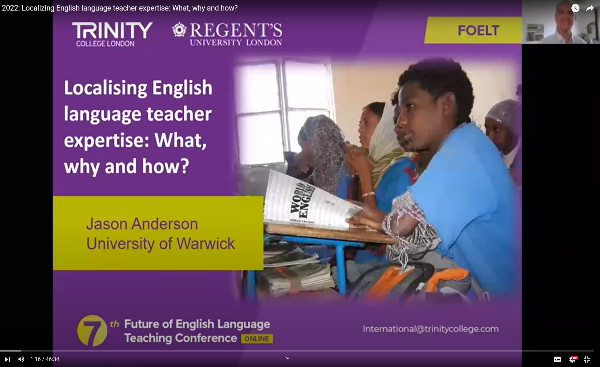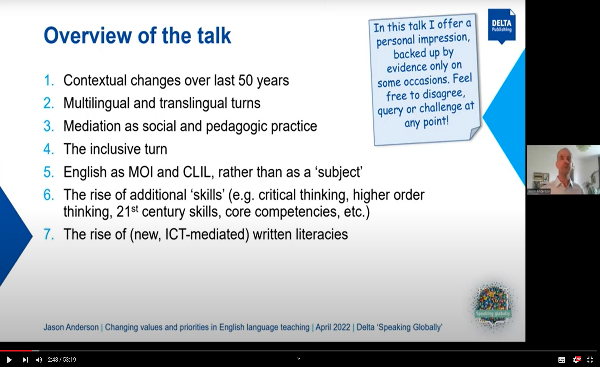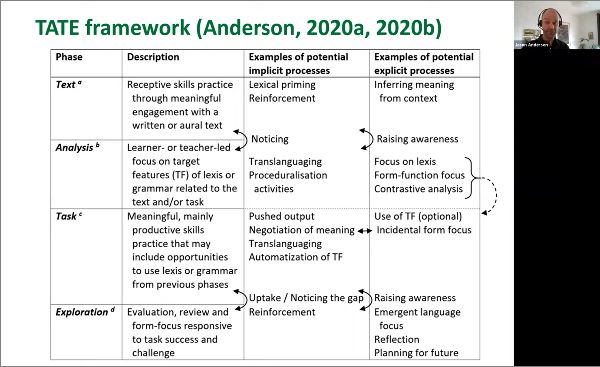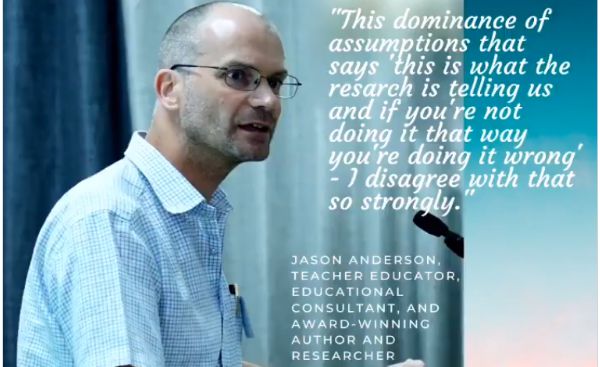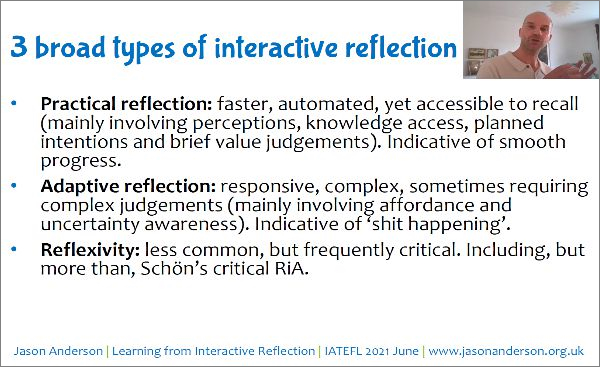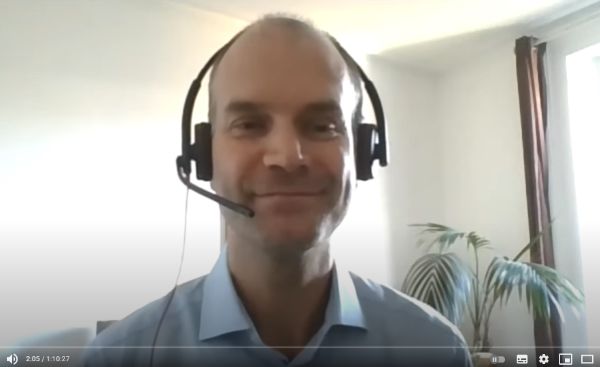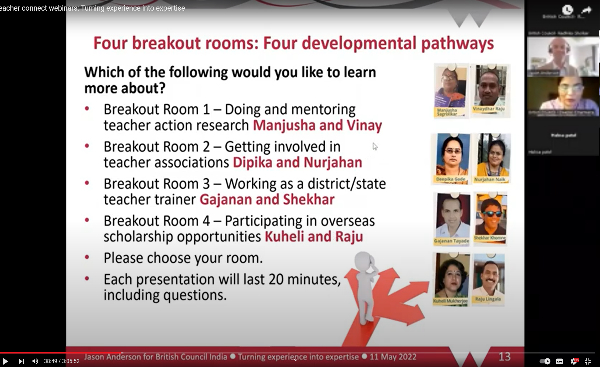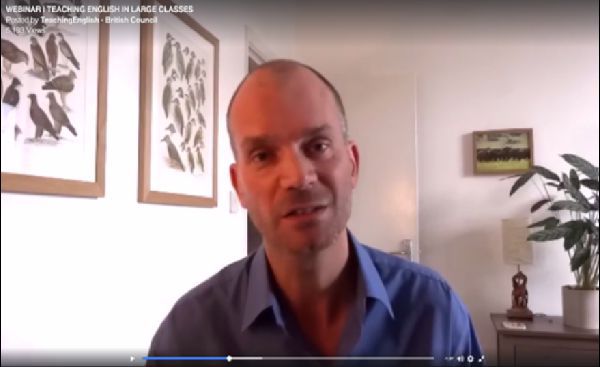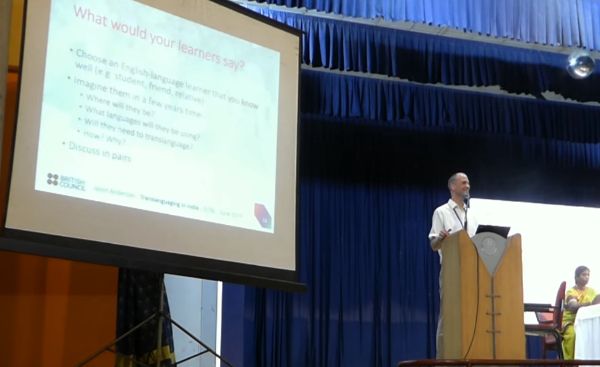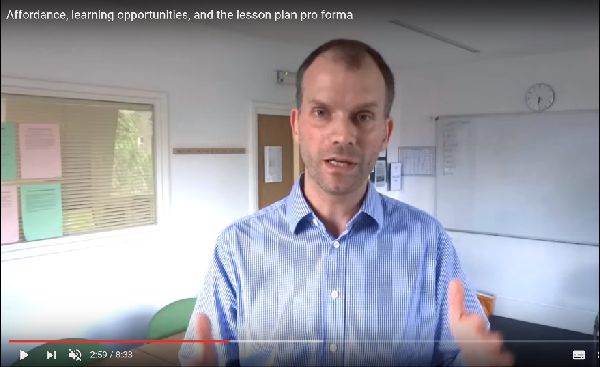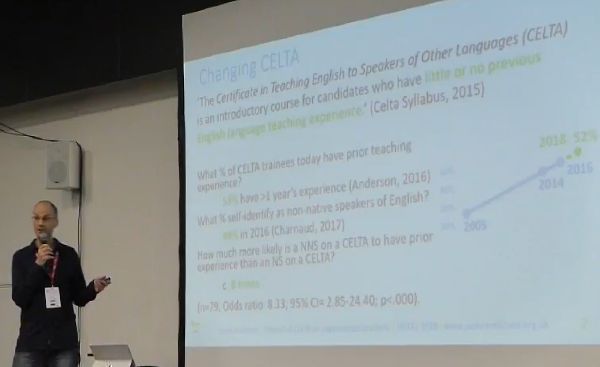Translanguaging in UK basic education: Exploring opportunities and strategies
Society of Heads, UK, May 2025
In this webinar we look at what translanguaging means, both as a term and as a pedagogy, focusing particularly on what it means for those of us who work in multilingually diverse classrooms in UK primary and secondary education: What are the implications of translanguaging theory? What are the practical challenges with drawing upon it in our own teaching? How can we best leverage our learners' multilingualism for the benefit of our classrooms, learning in our curricula, and our schools as microcosms of wider multicultural society in the UK. Slides here.
Multilingualism in African classrooms
Warwick in Africa, University of Warwick, April 2025
In this interactive webinar workshop, delivered to students at the universities of Warwick and Stellenbosch, Laurent Ahishakiye and I explore the challenges and issues involved in the complex interplay between different languages in African classrooms, discussing important case study examples from Laurent's own lived experience, as well as potential pedagogies that may support learning more effectively, particularly translanguaging. Slides here.
Narrative self-observation: A new teacher research and professional development tool
IATEFL Edinburgh, April 2025
In this talk, Jaber Kamali (Ibn Haldun University, Turkiye) and I introduce a new tool for teacher professional development and autoethnographic research. NSO draws upon research into narrative inquiry, autoethnography and unseen observation to create a self-observation process that is potentially able to foster, deeper, value-oriented reflection among participant teachers. Slides here. Toolkit: Guidance materials here. Please let us know if you want to use it in your work/institution.
Translanguaging in TESOL: Questions and directions
London TESOL Research Forum, Institute of Education, University College London, March 2025
In this talk I share personal reflections on key emerging questions around how translanguaging is being understood, interpreted and practised in the teaching of English as a named additional language (i.e., TESOL/ELT) also offering suggestions for two different directions that ELT could take – reconceptualising understandings of competence or moving beyond the limitations of 'competence' itself. Slides here. Similar talk online here.
Translanguaging in TESOL: Questions and controversies
Language, culture, matters. University of Warwick, UK, February 2025
In this talk I share personal reflections on some of the key emerging questions around how translanguaging is being understood, interpreted and practised in the teaching of English as a named additional language (i.e., TESOL/ELT), and more widely in additional language education. Slides here. Watch online here.
Diversifying teacher research practices: Controversies and opportunities
Future of Training, UK, November 2024
This talk, delivered both face-to-face and online at the Future of Training conference, involved participants both in evaluating current academic beliefs regarding what constitutes teacher research, and what types are typically legitimised by academics. We then considered the wider range of types of research, both formal and informal, that we do with our learners and how and why these are also important in helping to build our expertise as teachers. Slides available on request.
The language versus literature question in Indian ELT
ELT@I (English Language Teachers' Association of India) Webinar, India, November 2024
This invited webinar explores the negative impact of the choice to use a predominantly literature-oriented approach for primary and secondary education across the majority of Indian curricular boards. It strongly recommends a move towards EFL-type 'language teaching' to reduce the equity gap, and offers guidance for the many Indian teachers whose learners struggle with texts well above their proficiency level. Slides here. Full talk here.
Multilingualism and translanguaging: Opportunities and critical concerns for ELT classrooms in the Global South
10th Nationwide ELT Conference: English for All, La Paz, Bolivia, September 2024
In this talk we investigate what translanguaging is and why it offers a Southern theory of practice. Yet what does this mean for those of us who teach 'named languages', such as English? We explore this together. Slides here.
Teacher expertise around the world: Is there an expert teacher prototype?
10th Nationwide ELT Conference: English for All, La Paz, Bolivia, September 2024
This talk explores the question of whether it is possible to identify an expert teacher prototype. If so, what differences can we find between expert teachers in the Global South and the Global North? Implications also explored. Slides here.
A continuum of participation: Exploring different levels of participant involvement in (PhD) research projects
University of Malta International Doctoral Summer School, Malta, July 2024
In this talk we explore the idea that rather than either 'ladders' of participation or either/or options for participation or not, there is in fact a continuum of participation concerning how we collaborate with the participants in our research projects. Slides here.
Reflecting on our research: How, when and why?
University of Malta International Doctoral Summer School, Malta, July 2024
This workshop provides opportunities for us to examine how we reflect formatively (i.e., to learn) on our research projects, including a self-evaluation questionnaire and a list of tools, strategies and modalities, all potentially useful for reflection. Download and adapt the tools here.
Translanguaging as a Southern theory of practice: Exploring the possibilities for education
Humanities at the Crossroads Conference, NIT Warangal, India, May 2024
This talk explores the possibilities of translanguaging as one example of a practical Southern theory. Translanguaging theory has emerged primarily from observations and theorisation of 'peripheral practices' in Northern contexts, yet, it is abundant and natural across the Global South. We explore implications for education in India today. Slides here.
Implementing the Kurikulum Merdeka: Using lesson planning frameworks critically to plan English lessons for Indonesian schools
Makassar University, Indonesia, May 2024
In this 4-hr workshop we explored the relationship between the curriculum, the textbook and the lesson, using materials for the current Indonesian secondary curriculum to practise developing schemes of work and individual lesson plans tailored to the needs and interests of our secondary and primary-age learners. Slides here.
Cooperative learning: Making groupwork and pairwork effective
Anadolu University, Turkey, April 2024
In this workshop we looked at our own challenges with pairwork and groupwork. We examined some of the principles that were foundational to the cooperative learning movement, which popularised groupwork in the 1960s and 1970s. We then discussed critically aspects of how we do pair and groupwork in our classrooms to consider whether we can learn from re-embracing these principles. Slides here.
ELT teacher training at a crossroads: Where now?
IATEFL Brighton, UK, April 2024 (co-presented panel discussion with Judie Hudson, Gabriel Diaz Maggioli and Ben Beaumont)
In this panel discussion we explored recent trends and future possibilities for 'training' courses, both nationally-specific (e.g., BEd. degrees) and 'international' certification (e.g., CELTA, CertTESOL), looking for differences, commonalities, affordances and shared ideas of good practice. Slides here.
Teacher expertise research: Learning from the global South
TESOL Convention, Tampa, USA, March 2024
This presentation reports on the findings of one of the first studies of teacher expertise conducted in the global South, exploring the practices, cognition and personal characteristics of expert Indian teachers of English working in secondary education. Implications for teacher education, Southern theory and appropriate sustainable development are explored critically. Slides here. References here.
Developing a teacher research qualification for in-service teachers: Potential advantages and (present and future) challenges
The Future of Training Conference, International House London, November 2023
This presentation discusses some of the benefits and challenges of qualifications designed to enable in-service teachers to conduct research in their own contexts effectively, drawing on the example of a qualification that our team at the University of Warwick are developing.
Translanguaging and its potential importance for ELT in India
University of Hyderabad, Foundation Day Invited Lecture, September 2023
This talk explores the potential importance and implications of translanguaging theory and practice for teaching and learning in Indian classrooms, particularly for teachers of named languages such as English. Slides here.
TESOL textbook content in the global South: Challenges and opportunities for appropriate and sustainable learning
Advancing ELT for a Prosperous ASEAN Conference, Vietnam/online September 2023
This talk reports on an informal study I conducted analysing the content of ELT textbooks used in 15 countries across the global South, identifying different authorship scenarios and broad tendency differences between locally produced textbooks and 'global' coursebooks. A related article is published by NISSEM here.
New trends in language research and foreign language teaching
Online discussion, Vietnam, Thailand, UK, August 2023
This discussion, organised and led by Nguyen N. Quang involved Andrew Lian and myself, as well as 'audience' members in exploring recent trends in language teaching research in different communities around the world, including the rise and diffusion of translanguaging theory, the sociocultural and social justice turns, lingua franca Englishes and even artificial intelligence. Parts of the talk are available online here.
Partially participatory research: How 'non-participatory' research can involve participants meaningfully to increase equity and efficacy
AILA Conference, Lyon, France, July 2023
In this talk I explore the potential benefits and dangers involved in attempting to involve research participants meaningfully in the design and procedure of studies, even with methodologies that are not normally considered participatory. Online summary talk available here.
Communicative language teaching: Contrasting (British and German) views
AILA Conference, Lyon, France, July 2023
This presentation involved Tim Giesler, Sabine Doff, Richard Smith and myself in a critical discussion on how early developments, both theoretical and practical, in the history of communicative language teaching took rather different directions in German and British applied linguistics and practitioner circles.
The continuum of participation: How to make research socially responsive, socially responsible and socially useful
WICAL Conference, Warwick University, June 2023
This plenary workshop deconstructs the features of participatory research, arguing that collaboration, participation and action are different things that can be combined in varied ways to benefit all parties equitably. In it, we explore potential means for making a range of research designs participatory in applied linguistics research. Slides here. Padlet here.
How do, and how should we structure lessons?
Ibn Haldun University, Istanbul, Turkey, June 2023
This conference keynote talk investigated research on different lesson planning frameworks and curriculum design elements to offer teachers practical insights into the pros and cons of different ways of structuring lessons in language teaching and mainstream education.
Affordance-based lesson planning: How to plan positively for the unpredictable
Teaching House International, online, May 2023
This talk explores the relationship between written and mental lesson planning, how planning practices change as we gain experience, and offers a number of suggestions for how we can make our planning more 'affordance-friendly', especially in the use of lesson plan pro formas. Watch the talk online here. Slides here.
This house believes that translanguaging constitutes a fundamental paradigm shift for the teaching of English
ELT Journal Debate, IATEFL Harrogate, UK, April 2023
I participated in this year's Oxford University Press ELT Journal debate, arguing for the motion, which was opposed by Jeanine Treffers-Daller of the University of Reading. My arguments addressed the potential implications of translanguaging as theory and practice for our understandings of competence in ELT, its role in new contexts for ELT around the world and the role of the translingual teacher in facilitating learning.
Partially participatory research: A way to make researcher-led projects more equitable
IATEFL Harrogate, UK, April 2023
This poster, presented at the IATEFL Research Special Interest Group pre-conference event, proposes partially participatory research as a useful and valid alternative to participant-led research, identifying reasons why fully participatory research isn't always desirable and offering an example from my own PhD research on expert teachers in India. View and download the poster here. Watch a related online presentation here.
Decentring ELT research: Alternatives to centre-disseminated 'best practice' models
2nd Decentring ELT Conference, online, March, 2023
This presentation proposes a means for developing locally appropriate understandings of good practice in ELT through the systematisation of local and national research networks to co-ordinate teacher action research, PhD studies, teacher expertise research and large-scale meta-analyses and meta-syntheses. By doing so, we can move away from the problematic dissemination of notions of 'best practice' from the Anglophone ELT centre. Watch the presentation online here.
What might 'English' mean today?
Stafford House Annual Conference, London, UK, February 2023
This talk invites participants to examine the identity of English today in the light of recent changes both in its role in the world, and our understanding of it as an object of instruction as ELT/TESOL practitioners. The impact of the English as a lingua franca, translanguaging and TEFL equity movements will be considered, as will the increasing variety of contexts in which English is gaining meaning and power, albeit in various ways. Slides here.
Building our understanding of 'good teachers': What school leaders and teacher educators can learn from teacher expertise research
International House AMT Conference, London, UK, January 2023
In this talk we explore both our own understandings of 'good' when talking about teachers and teaching, and research that may shed light onto this issue, such as our recently published systematic review of teacher expertise research (Anderson & Taner, 2023). A handout for the talk is available here.
The emergence of teacher expertise: How expert teachers gain expertise and continue developing
Future of Training Conference, November 2022
This talk explores aspects of the theory and evidence on teacher expertise, particularly with regard to professional learning and development to investigate the potential factors that may differentiate expert teachers from experienced non-experts. A differentiated pathway towards teacher expertise is also proposed. Watch the talk online here.
Teacher expertise theory and research in the global South and North: What it tells us about expert teachers around the world
Teacher Development Webinars, September 2022
This talk explores both the wider literature on teacher expertise around the world and my own research into it in India, investigating two related questions: What are the most frequent findings of studies of expert teachers? And, to what extent do these findings vary when we examine the cognition and practice of expert teachers working in contexts in the global South? Watch online here.
Localising English language teacher expertise: What, why and how?
Future of ELT Conference Plenary, June 2022
In this talk I address the question as to how more localised, context-sensitive understandings of expertise in educational practice can be developed for diverse contexts and outcomes around the world, examining why this is necessary and a range of 'teacher-friendly', network-oriented and researcher-led activities can contribute towards this goal, also offering useful professional development activities in the process. Slides here. Watch online here.
English language teacher expertise in India: A participatory case study
IATEFL Belfast, May 2022
In this talk I share findings and implications from my PhD study involving eight expert secondary teachers of English from across India. As well as highlighting important similarities and differences among the participants’ practice, cognition and professionalism, I will argue that similar studies in low-income contexts can help to build an knowledge base for effective pedagogy across the Global South. Slides here.
Turning experience into expertise: How can we continue developing as English language teachers?
British Council India, English Connects Programme, May 2022
In this webinar, co-presented with the eight expert teachers from my research in India, I present some of the key features of expert teacher professionalism, including as found in my research in India. The eight expert teachers themselves lead breakout room discussions on 4 of the approaches involved. Slides here. Watch online here.
Changing values and priorities in English language teaching
Delta Publishing Speaking Globally Webinar Series, April 2022
This webinar offers a personal view of how important contextual changes in where, when, how and why English is being taught in classrooms around the world are gradually influencing the values and priorities underpinning our practice as English language teachers. It looks at the translingual turn, the inclusive turn, mediation and the rise of new written (often digital) literacies as key influences in this process. Slides here. Watch online here.
Stories of effective teaching workshop series
AINET India, April-August 2022
This series of five discussions with the eight expert Indian teachers of English from my PhD research project explores a number of areas of teaching that were important to their efficacy. In each talk, after a brief introduction, two or three of the teachers discuss these aspects of their practice, with audience participation where time permits. The following are available on Facebook:
* Effective use of pairwork and groupwork in the classroom
* Effective project work in Indian classrooms
* Working effectively with texts in your classroom
Inclusive multilingual practices among expert Indian secondary teachers of English
Symposium on World Language Education, February 2022
This presentation addresses a key challenge being faced by language teachers around the world today: that of promoting more multilingual approaches to additional language learning even within monolingual curricular frameworks, drawing upon the findings of my teacher expertise study in India to offer evidence of how this can be done in one particular context. Slides here.
Effective teaching: Stories from experience: Conference plenary symposium
AINET India National Conference, January 2022
This conference symposium involved the eight teachers in my PhD study, and myself as symposium chair. In it we explored two key areas of difference among the participant teachers in a teacher expertise study: How they supplement core curriculum texts in their own classrooms, and how their knowledge of their own learners and their needs enabled them to teach English more effectively. Slides here.
Learning from interactive reflection
IATEFL 2021, June 2021
This talk reports on my earlier research into Schön’s ‘reflection-in-action’ in EFL teachers’ in-classroom (i.e. interactive) cognition. It offers a number of original, empirically-derived tools for studying, raising awareness of, and developing our ability to learn from interactive reflection. Questions, comments and critical feedback on the tools will be welcomed, as will suggestions for future use. Watch here. Slides here. Two tools for promoting teacher reflection literacy here.
A framework for project-based learning in ELT
Delta Publishing, May 2021
This workshop offers a basic framework for the use of project-based learning in English language classroom, focusing on the interests and creativity of our learners and how these can be leveraged to improve motivation and provide opportunities to use English in ways that are likely to replicate future work and study contexts. Slides here. Handout here. Article here.
Teacher expertise in the Global South: Initial findings from a participatory comparative case study in India
University of Warwick, Applied Linguistics Seminars, May 2021
This talk reports on some of the methodological challenges and initial findings of a comparative case study (PhD) involving eight Indian secondary teachers of English (available here). I will discuss how expertise was theorised for the study and how participants were involved in the study design, also summarising key findings and potential implications for building understandings of appropriate good pedagogic practice for low-income contexts worldwide. References here.
Qualitative and quantitative data analysis for teacher research
ELTA Telangana, India, May 2021
This talk provides an overview of one specific exploratory action research project as a 'worked example' of how data collection and analysis can be iterative, responsive and avoid the technical and time-consuming challenges of analysis for more formal academic research, focusing on how 'puzzles' and a quest for understanding can form the basis both for the research itself and how we define success in our classroom-based research - no prior research experience necessary! Watch here. Slides here.
Contemporary lesson planning frameworks in TESOL
Dublin TEFL, Ireland, May 2021
In this talk we explore 'traditional' (e.g. PPP, ESA) and 'responsive' (e.g. TBLT, Dogme) frameworks for lesson planning in language teaching. I introduce my two recent contributions: CAP and TATE, and argue that the latter strikes a balance between needs for pre-planned curricular content and responsive form focus, looking at key factors that may influence our choices of such frameworks (e.g. learners' needs, teacher experience, lesson type, etc.). Watch here. Slides here.
A study of teacher expertise in the Global South: Eight expert Indian teachers of English
"Frontiers of Education and Activism" 8th Annual Education Studies Postgraduate Research Conference, Warwick, UK, April 2021
Reports on early findings of a participatory comparative case study of teacher expertise conducted in Indian mainstream secondary education, part of my PhD research project. Includes an overview of design of the project, data collection and analysis. Key findings demonstrate strong support from prior studies of teacher expertise (almost all from the Global North), as well as some important differences resulting both from contextual challenges and personal approaches.
Contemporary lesson planning frameworks
IATEFL Ukraine, April 2021
In this plenary for IATEFL Ukraine, we take a look at both 'traditional' (e.g. PPP, ESA) and 'responsive' (e.g. TBLT) frameworks for lesson planning in language teaching. I also discuss my two recent contributions: CAP and TATE, the latter I argue strikes a balance between needs for pre-planned curricular content and responsive form focus, looking at key factors that may influence our choices of such frameworks (e.g. learners, our own experience and confidence, lesson type). Slides here.
Contemporary lesson planning frameworks for language teacher education
ETAI teacher training and development SIG, February 2021
In this plenary for ETAI, I discuss two key challenges that novice teachers face with regard to planning and structuring lessons and units of learning during pre-service and early in-service development. I suggest two planning models: CAP as a more directive framework (useful to begin with), and my recent TATE model as a more complex, research informed framework to scaffold their development and practices towards more learner- and learning-responsive approaches to facilitating learning in the English language classroom. Slides here.
Making teacher action research 'learning-centred'
National Academy for Primary Education (NAPE), Bangladesh, December 2020
In this webinar, we explore how we can make action research for teachers (both pre-service and in-service) as useful as possible for their classroom practice, and also how we can reduce the workload that is often associated with data analysis and report writing. Slides here. Watch the full talk here.
Project-based learning in Saudi universities: An exploratory workshop
Saudi TESOL, KSA, December 2020 (Keynote Plenary)
This workshop offers a basic framework for the use of project-based learning in English language classroom, focusing on the interests of tertiary learners and how these can be leveraged to improve motivation and provide opportunities to use English in ways that are likely to replicate future work and study contexts. Slides here. Watch the full talk here.
Challenges and solutions for effective communication in our classes
Delta Publishing (Russia), December 2020
This interactive webinar involves participants in identifying key challenges that teachers face in classrooms in Russia when trying to engage students in spoken interaction to develop their speaking and listening skills. We discuss a number of possible solutions that can help with some of these challenges. We finish with some simple ideas for classroom research to investigate the problem and try out your chosen solutions! Slides here.
Text interpretation: India's hidden pedagogy
KAASH Foundation / ELT@I India FDP on Emerging Approaches and Trends, India, August 2020
English curricula across India are often ambitious, seeking to combine initial literacy learning, fluency development and the appreciation of literature in what is a foreign language for most Indian children. This challenging combination has led to many innovative approaches in Indian classrooms. In this talk I explore one of these, the practice of "translingual text interpretation", common in underprivileged primary/secondary contexts. I will describe some features of effective text interpretation observed during recent research, explore pathways towards more independent reading practices, and argue for further discussion of this often misunderstood pedagogy. Slides here. Available online at KAASH Foundation YouTube Channel.
Keeping ahead in times of crisis
Discussion with Maha Hassan for the ESL Teaching Hub, Egypt, July 2020
Our discussion focuses on a range of issues of importance today, such as the challenges of teaching in large classes and low income countries, Jason's TATE curriculum design model and its possible relevance to Egyptian and other developing country contexts, and even (briefly) the future of language teaching! Watch online here.
Online writing (and reading) practice: Practical ideas from and for teachers of English in India
Emerging Challenges: Constructive Online Teaching and Learning, Online Conference, India, July 2020
This online talk focuses on some of the challenges that English teachers in India are facing while teaching writing skills to large classes of low-income learners online. Using a range of online writing tools, and 'loop input' strategies, we explore participants' solutions to these challenges, including using chat functions on video conferencing software, getting the most out of Padlet, What's App and lo-tech solutions for 'one-phone' families. We also preview a successful online reading club that teachers in Maharashtra have recently developed, with the help of Manjusha Sagrolikar. Slides available here. Padlet created by participants here. More about the online reading club here.
Interview with the Teacher Talking Time Podcast
Online interview, June 2020
In this interview with Andrew Woodbury of the "Learn Your English" Teacher Talking Time podcast, we discuss a range of topics, particularly my research into the PPP paradigm, synthetic syllabi, my recent TATE curriculum design framework, TBLT and reflective, practice-oriented approaches to teacher education. Listen to the podcast on their website here.
Teaching the discourses: Challenges and possible solutions
ELTA Telangana, India, June 2020, with Prathikantam Vinayadhar Raju, Mamatha Sadu, Laxman Vangara and colleagues
This online discussion focuses on the opportunities and challenges presented by a key feature of Telangana State Curriculum's recently introduced approach to incorporate a range of functional 'discourse' types (genres) into the secondary English curriculum. Through discussion with colleagues we identify some of the challenges that teachers are facing with this innovation, and also look at how several teachers are introducing activities, projects and tasks to turn the challenges into learning opportunities in their classrooms. Watch the event online here.
The PPP paradigm in language teaching, and its relevance to Indian classrooms
Facebook Live event for the AINET teacher association, India, April 2020
This 'presentation', followed by critical discussions with three experienced Indian teacher educators and teachers, explores PPP from an Indian perspective, including its extent in Indian classrooms, its potential usefulness, and compares it with other potential models of use, such as task-based language teaching. Watch the event online here.
Principles and practices of cooperative learning
Webinar for Delta Publishing, March 2020
This webinar looks at the two core principles of cooperative learning, and examines why they are important to making pairwork and groupwork effective in the ELT classroom. We explore a range of cooperative learning activities to illustrate these principles from my recent book Activities for Cooperative Learning, part of the new Delta Publishing ‘Ideas in Action’ series that links aspects of pedagogic theory to practice and supports teachers in developing their own materials based on such theory. Watch the talk online here. Slides here.
The effective teacher of English: Perceptions and opinions of Indian teachers
5th AINET International Conference, Hyderabad, India, January 2020
This plenary talk reports on original research into the beliefs and perceptions of members of the AINET English language teacher practitioner community regarding the classroom practices, personal characteristics, beliefs and values of an effective secondary level teacher of English working in the state school education system in India.
Let's discuss the translation method
5th AINET International Conference, Hyderabad, India, January 2020
This workshop invites participants to share and explore how they help their learners to understand highly challenging (often literary) texts common in English language curricula across India. It shares a range of potential strategies to support learning in such classes, and encourages participants to reflect on their practices critically. Slides here. Handout here.
Topsy-turvy teacher training: An attempt to blend top-down and bottom-up approaches to in-service language teacher education
International House Future of Training 2019 Conference, London, UK, November 2019
This talk reports on an in-service teacher training programme conducted in China for tertiary English language teachers from two of the poorest provinces in the country. The programme involved both top-down (traditional training) and bottom up (collaborative and individual teacher research) elements. The talk also reports on the findings from a follow-up webinar conducted 6 months later to find out how the teachers had got on since the programme. Click here for an article reporting on the research.
Learning English with all our languages: How a translingual perspective can help in Indian classrooms and curricula
English and Foreign Languages University, Hyderabad, India, September 2019
This workshop explores the theory and practice of translanguaging, both in society and in Indian classrooms. It provides opportunities for participants to share their perspectives and opinions on all these areas, as well as sharing research findings from a range of studies, and my recent research in secondary classrooms. Slides here. Handout here.
"Understanding and doing teacher research" (co-presented with Rama Mathew)
English and Foreign Languages University, Hyderabad, India, September 2019
This opening plenary for the British Council "Mentoring Teacher Research" seminar introduces participants to teacher research, including overview of different types, benefits and challenges, and advice on how to get started and find support, focusing specifically on the needs and challenges of Indian teachers and teacher research mentors. Slides available here.
"In-service workshops: What, how and why?"
Warwick in Africa, University of Warwick: May 2019
This workshop looks critically at important features of in-service workshops, particularly those delivered within educational programmes aimed at introducing change of some kind to experienced, in-service teachers. It is experiential, and includes meta-reflection ('loop input') on how the features of this workshop necessarily mirror those being tentatively recommended. Designed for teacher educators and trainers working in low-resource contexts. Slides here. Handout here. 'Key features' cards here.
"Deconstructing jigsaw activities"
IATEFL Liverpool: April 2019
Looks at the nature and origins of jigsaw activities in language teaching, suggesting a number of ways they may be varied and potentially improved. Also suggests several original ideas for jigsaw tasks. Access slides here. Access handout: A taxonomy of jigsaw activities for language teachers.
"Translanguaging in Indian classrooms abhi aur bhavishi me"
Ambedkar University Delhi: January 2019
Reports on our recent study Anderson & Lightfoot (2018), reflects critically on the data, and poses a number of questions for consideration and future research. Slides here.
"Effective differentiation through cooperative learning"
English UK North Conference, Sheffield, UK/ English UK Southwest Conference, Glastonbury, UK: Both October 2018
In true cooperative learning style, this workshop provides participants with the understandings and opportunities to learn how the cooperative classroom can facilitate differentiation, both in younger learner and adult classrooms. Handout here.
3 useful inputs/workshops to help experienced teachers on CELTA and CertTESOL courses
Cambridge CETA Conference, Kyiv, Ukraine, September 2018
Building on my research into the needs, career paths and challenges faced by experienced teachers of English on Cambridge CELTA and Trinity CertTESOL courses, I propose 3 input sessions/workshops useful and important on such courses for adaptation and use by colleagues. Feedback welcome. Download slides here. Download the resource materials from my Resources page here.
"3 is the magic number: 50 years of lesson planning paradigms in ELT"
Teaching House, London, UK: August 2018
In this talk I provide a whistlestop tour of lesson planning frameworks or paradigms, from Herbart's 'recitation' in the late 1800s through to my own paradigm, C-A-P-(E) based on recent research on coursebooks and pre-service training courses. Also incorporates some of my research into the origins of the enduring PPP structure and a hint at the source of TTT (test-teach-test). Download slides here and handout here.
"Every teacher is an expert: Empowering teachers working in low-resource classrooms"
Webinar for IATEFL Global Issues SIG, June 2018
In this webinar I suggest 6 principles for subverting top-down 'teacher training' projects, both for teachers and teacher educators to draw upon to reduce the transmissive nature of such interventions, including practical ideas for critical appropriation and context-sensitive interpretation.
"Effective differentiation through cooperative learning"
Future of ELT, Regent's University, London, UK: June 2018
In true cooperative learning style, this workshop provides participants with the understandings and opportunities to learn how the cooperative classroom can facilitate differentiation, both in younger learner and adult classrooms. Handout here.
"CertTESOL and CELTA syllabi of the future"
Supersize your Cert: Professional development day, University of Central Lancashire, UK: May 2018
Workshop in which we compare two initial teacher training course syllabi, and imagine how we could and would improve them to make them inclusive of the needs of all participants if the syllabus constraints were removed. Handout here. Posters created here.
"What impact does CELTA have on experienced teachers' classroom practices?"
IATEFL Brighton, UK: April 2018
Talk reporting on my most recent research on experienced NNESTs on CELTA courses, and its impact on their self-reported classroom practices 6 months later. Also provides summary recommendations from 4 years of research. Slides here. Watch it on YouTube here.
"The L1-inclusive classroom: Learning English with all our languages"
4th AINET International Conference, Mumbai, India: Febuary 2018
Workshop in which we discuss and share our ideas for how we use learners' languages in the English language classroom. Slides here. Handout here.
"Effective differentiation through cooperative learning"
English UK: London, UK: January 2018
In true cooperative learning style, this workshop provides participants with the understandings and opportunities to learn how the cooperative classroom can facilitate differentiation, both in younger learner and adult classrooms. Handout here.
"The role of CELTA in the CPD of non-native speaker teachers"
CETA Conference - Sheffield, UK: September 2017
After reporting on my research into non-native speaker teachers on initial teacher training courses such as the CELTA, this workshop provides participants with opportunities to discuss recommendations and potential implications. Abstract and references here.
"Context, Analysis, Practice - How we actually stage lessons (with Jason Anderson)"
TEFL Training Institute Podcast: July 2017
This podcast focuses on my Context, Analysis, Practice model, discussed with Tracy and Ross from the TEFL Training Institute. A short overview for those who are interested. Click hear to listen to it on YouTube.
"Translanguaging in English language classrooms in India: Why, when and how?
ELTAI Annual Conference - Kochi, India: June 2017
Conference plenary. Translanguaging is an ancient and natural practice in India. It is a practice that could not be further from the monolingual norms of language use that have shaped western approaches to language teaching for over a century. After reporting on two recent research projects, one in India, this workshop considers why, and explores how, India can take a different path to effective competence in the use of English. Resources here. References here. Watch it on YouTube here.
"Reimagining English language learners from a translingual perspective"
Plenary: ETP Live! - Brighton UK: June 2017
This workshop considers the potential implications of adopting more translingual perspective in English language teaching, reporting on a study in which the majority of 116 'EFL' learners anticipated a need to use English translingual in the future. Practical ideas and resources are also suggested. Resources here. References here.
"Translingualism and translanguaging: What are they and why are they important for the future of ELT?"
The Future of English Language Teaching Conference - Regent's University, London, UK: June 2017
In this workshop we compare and share our understandings of the term 'translingualism' and the practice of 'translanguaging', exploring their possible implications for us as English langauge teachers, both in the UK and around the world. Resources here. References here.
"Context, analysis, practice: The hidden paradigm in contemporary ELT"
IATEFL Glasgow, UK: April 2017
Recent shifts towards more text-based approaches in published materials and 'communicative' classroom practices lend support to a lesson planning model involving 3 stages: Context, analysis, practice. This talk explores how it can be used to support trainees on pre-service courses, and its wider application in ELT. Resources here.
"Peer needs analysis: Sensitizing learners to the needs of their classmates"
Devon DOS Association, UK: March 2017
There are a number of advantages to raising learners' awareness of the needs of their classmates. This workshop investigates how it can be done effectively, why it's a good idea and provides some useful resources for experimentation in the classroom. Resources here.
"Sharing our intentions with the learners"
Embassy English, London, UK: March 2017
Exploratory workshop in which we discuss and compare how we make our intentions clear to our learners. We also look at evidence-based research on this issue, and its implications for our practice. Related article here.
"The uniqueness of gameplay"
Teaching House, London, UK: February 2017
Exploratory the Role of gains in language learning, issues of authenticity and how games can include an explicit focus on languageWhile still retaining authenticity. Watch it on YouTube here. Related article here.
"Playing games with younger learners"
English Teacher Training College, Austria: December 2016
Concluding plenary talk/workshop investigating the the relative merits of cooperative and competitive gameplay for children and teens, and how we can use them to facilitate learning effectively.
"Peer needs analysis: Sensitizing learners to the needs of their classmates"
English UK 2016 Teachers' Conference, London, UK: November 2016
There are a number of advantages to raising learners' awareness of the needs of their classmates. This workshop investigates how it can be done effectively, why it's a good idea and provides some useful resources for experimentation in the classroom. Resources here.
"Teaching English in Large Classes: A sociocultural approach"
Webinar for the British Council: October 2016
In this webinar recording, we explore how teachers of English working in large classes can develop local solutions to the challenges they face, by collaborating with colleagues in their school community and wider social environment. Watch it here.
"Using learners' mother tongues for teaching English in Egypt"
Pharos University International ELT Symposium, Egypt: September 2016
Closing plenary exploring how Egyptian English teachers can use Arabic (and other L1s) effectively when planning, teaching and assessing their learners. Slides here. Resources here.
"Why PPP won't (and shouldn't) go away"
IATEFL 2016, Birmingham, UK: April 2016
The most enduring paradigm in recent language teacher education is communicative, 'learner-sensitive' and can no longer be argued to be incompatible with SLA research evidence. Resources here.
"Translingual competence and the EFL learner"
Stafford House, Cambridge, UK: March 2016
Conference opening plenary presenting the results of experimental research on the degree to which 116 EFL learners may need translingual competence in the future, and what this means for their teachers. Resources here.
"Sharing our intentions with the learners"
London School of English, UK: January 2016
Exploratory workshop in which we rationalise and compare how we do or don't share our intentions for a lesson with the learners. We also look at evidence-based research into this question, and its implications for our practice. Related article here.
"Translingualism and translanguaging - what do they mean for TEFL... if anything?"
International House, London, UK: June 2015
Presentation followed by plenary discussion on the concept of translingualism and the practice of translanguaging from bilingual studies, relating them to our work as language teachers. Slides here. Handout here.
"Using Learners' Mother Tongues in the ELT Classroom" May 2015
British Council ELT Conference, Oran, Algeria Workshop investigating the advantages of using Algerian learners' L1s, and ideas for activities. Booklet: Multilingual language learning in Algerian classrooms (created by Algerian teachers) here.
"Why lying is the best policy... to get learners speaking"
IATEFL 2015, Manchester, UK: April 2015
Workshop in which we try out a range of deception-based activities from Speaking Games. Resources here.
"Have I got a dragons' den for you?"
English UK Conference: London, UK November 2014
Workshop in which we look at ELT classroom activities based on popular television and radio shows. Resources here.
